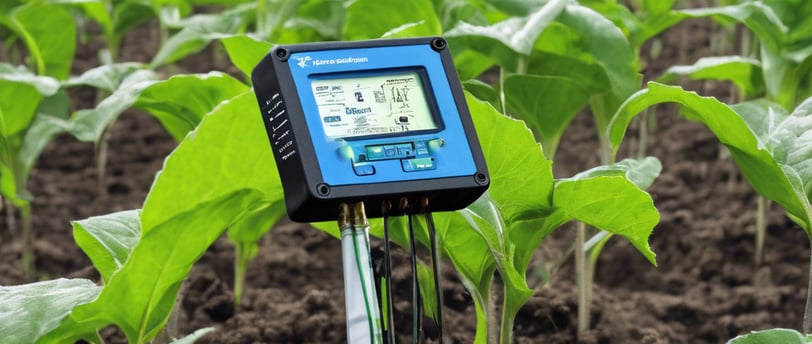Revolutionizing Farming in Nepal: How Agera's Sensor-Based Technology is Tackling Climate Change
Agriculture is the lifeblood of Nepal, with millions of smallholder farmers depending on their land for livelihood. Yet, in recent years, climate change has presented unprecedented challenges, putting food security, crop yields, and farmers' income at risk. Erratic rainfall, increasing temperatures, and extreme weather events are forcing farmers to reconsider traditional practices. Fortunately, technology is stepping in to offer solutions, and Agera is at the forefront of this agricultural revolution in Nepal.
SENSOR AND TECHNOLOGY
5/8/20243 min read


The Growing Impact of Climate Change on Nepal’s Agriculture
Nepal’s agriculture is particularly vulnerable to climate fluctuations. Unpredictable weather patterns often result in either too much or too little rainfall, making it difficult for farmers to plan their planting seasons, manage irrigation, or prevent crop losses. As temperatures rise and weather patterns become less predictable, farmers face crop failures, reduced yields, and increased costs of production. Without timely data, they are left to rely on outdated practices that no longer work in today’s changing climate.
A Data-Driven Solution for Climate-Smart Farming
Agera’s sensor-based system offers farmers a lifeline in the fight against climate variability. By providing real-time data on critical soil and environmental conditions—such as soil moisture, temperature, nutrient levels (NPK), and pH—Agera enables farmers to make better decisions for their crops. This isn’t just about knowing what’s happening in their fields today; it’s about having the foresight to anticipate changes and take preventive action, long before climate-related issues impact their yields.
Precision Agriculture for Climate Resilience
Through Agera’s sensors, farmers gain access to accurate data that is tailored to their specific crops and environmental conditions. Here’s how it works:
Irrigation Optimization: With real-time data on soil moisture levels, farmers can ensure they are using water efficiently, especially during periods of drought or water scarcity. This not only reduces water wastage but also helps prevent over-irrigation, which can lead to waterlogging and soil degradation.
Temperature Monitoring: Agera’s temperature sensors alert farmers when conditions are too hot or too cold for optimal crop growth. This data allows farmers to take timely action, such as adjusting irrigation schedules, installing shade cloth, or using appropriate crop varieties that are resilient to heat.
Nutrient Management: By monitoring NPK levels, farmers can apply fertilizers only when necessary, reducing the overuse of chemical inputs. This precision reduces the environmental impact while ensuring that crops receive the nutrients they need for healthy growth.
pH and Soil Health: Agera’s sensors measure soil pH, providing critical insights into soil health and fertility. With these insights, farmers can take corrective measures to balance the soil, leading to better yields and healthier crops.
Early Alerts for Extreme Weather Events
Agera’s real-time monitoring capabilities go beyond daily data collection. The system’s autonomous alert mechanism notifies farmers when they need to take immediate action to protect their crops. This can include warnings about drought conditions, frost, or sudden temperature changes that could impact germination or crop growth. By receiving these alerts, farmers can implement measures such as mulching, irrigation adjustments, or protective barriers to shield their crops from damage.
This proactive approach to climate management enables farmers to stay one step ahead, improving their climate resilience and reducing the risks associated with extreme weather.
Promoting Sustainable Farming Practices
In addition to helping farmers manage the day-to-day challenges of climate change, Agera also promotes sustainable farming practices. By encouraging more efficient use of water, fertilizers, and other inputs, Agera reduces the environmental footprint of agriculture. This is particularly important in Nepal, where unsustainable practices such as over-irrigation and excessive chemical use are contributing to soil degradation and water pollution.
Through data-driven recommendations, Agera supports farmers in adopting climate-smart practices that promote long-term sustainability. These practices not only protect the environment but also improve the profitability of farming by reducing input costs and increasing yields.
A Vision for the Future: Scaling Agera Across Nepal
While Agera is currently making strides with pilot projects and early adopters, the potential for scaling this technology across Nepal is enormous. With the support of government bodies, research organizations, and international partnerships, Agera aims to reach more farmers in both rural and commercial farming communities.
Scaling Agera will help ensure that more farmers in Nepal are equipped with the tools they need to adapt to climate change, improve their productivity, and secure a more sustainable future for themselves and their families. As Agera expands its reach, it will play a crucial role in building climate resilience across Nepal’s agricultural sector.
Conclusion: The Future of Farming in a Changing Climate
As Nepal’s farmers face the realities of climate change, innovative solutions like Agera are more important than ever. By combining cutting-edge sensor technology with actionable insights, Agera is helping farmers not only survive but thrive in the face of environmental challenges. Through climate-smart, data-driven practices, Nepal’s agricultural sector can become more resilient, sustainable, and productive.
Agera’s vision for the future of farming is one where technology and tradition come together to empower farmers, protect the environment, and ensure food security for generations to come. With Agera, the future of farming in Nepal is bright—even in the face of climate change.



